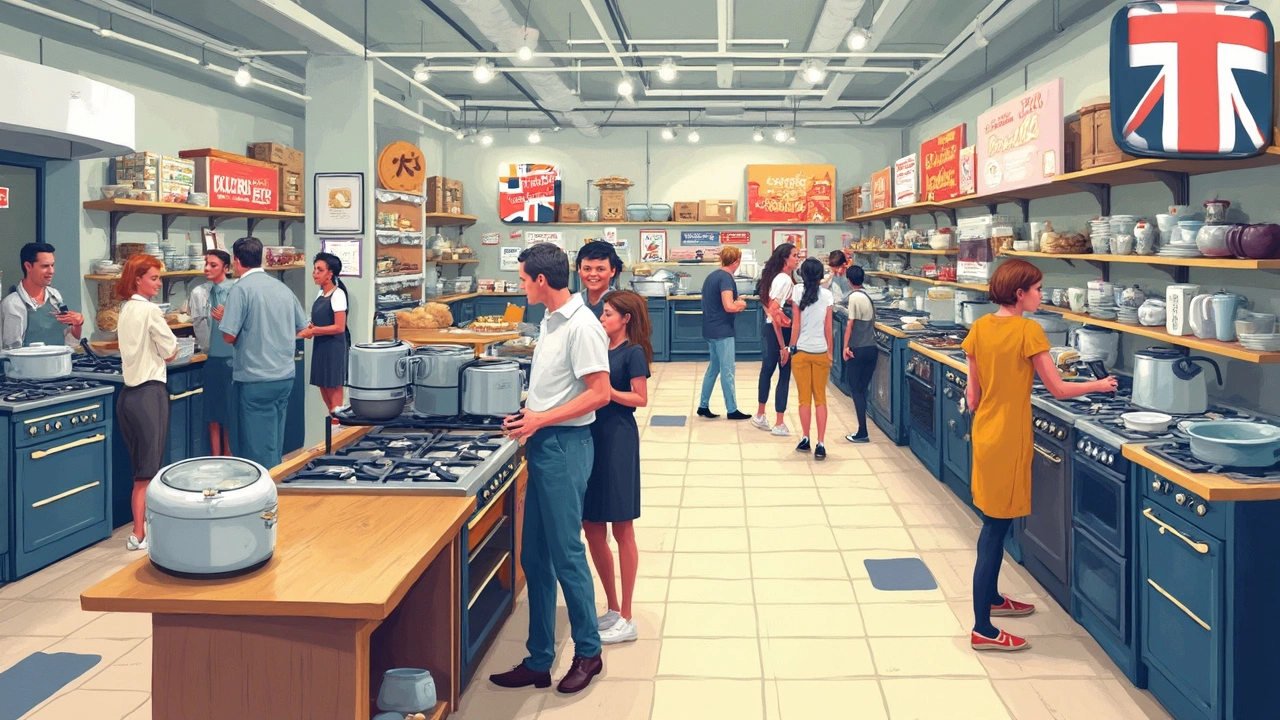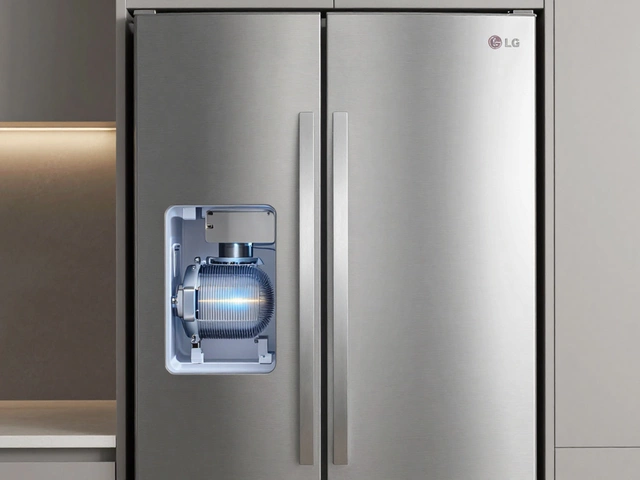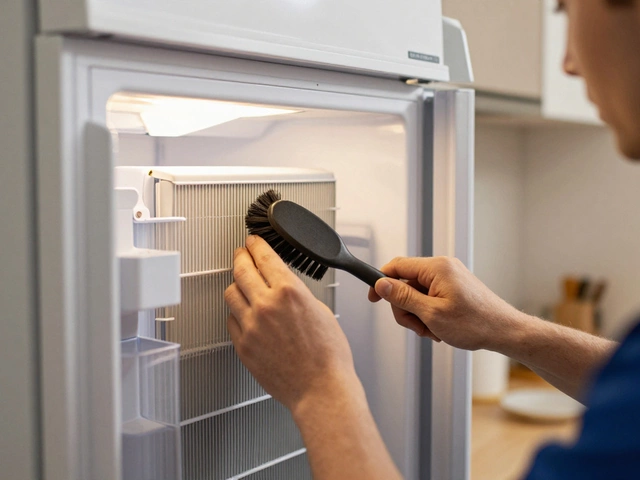Ever bought a cooker that just didn't live up to the hype? It's frustrating when a pricey appliance turns into a repair project a year or two down the line. We've been there, too, and that's why we're digging into which brands actually give you the most bang for your buck.
First off, understanding the lifespan of kitchen appliances helps you make smarter choices. The average life expectancy of a cooker tends to range between 10-15 years, depending on the brand and how often you use it. But some brands outperform the rest, offering longer durability and less hassle over time.
Brands like Bosch, Miele, and Samsung often top the durability charts, especially in the cooker category. They are consistently praised not just for their initial performance but for holding up over time. This endurance often comes down to quality materials and solid construction.
But buying a reliable brand is just the first step. How they're maintained can make all the difference. Regular cleaning, avoiding overloading, and timely repairs can prevent those dreaded visits from the repair guy.
- Understanding Appliance Lifespan
- Top Durable Brands
- Features to Seek for Longevity
- Why Cookers Fail
- Tips for Extending Appliance Life
- Choosing Wisely for Your Kitchen
Understanding Appliance Lifespan
Let's get into it—how long should your appliances, especially those trusty cookers, actually last? Knowing this can help you plan, budget, and ultimately save a heap of hassle.
Generally, most kitchen appliances are expected to last anywhere between 10 to 15 years. We're talking about well-made ones here. Budget cooker brands might not give you more than a decade, but invest in something from a top-tier brand, and you might push it to 15 years or more.
Here's a kicker: The lifespan varies hugely between different types of appliances. For example, a refrigerator often goes strong for about 13 years, while a microwave might only see 9 years on average. Cookers sit right in the sweet spot with their 10-15 year range.
Quality Over Quantity
It's tempting to go cheap, especially if it looks good on the showroom floor. But for durable products, focus on quality. A respected source in home economics, Jane Forrester, once said,
"Spending a little more upfront on a reliable brand can save you hundreds in repairs down the road."
Factors That Influence Lifespan
Why do some cookers break down sooner than others? Several factors come into play:
- Usage: Frequent use can wear parts down faster.
- Maintenance: Regular cleaning can prevent component failure.
- Brand: Higher quality brands tend to use more durable materials.
- Model: Some models within the same brand just hold up better than others.
A Handy Table for Your Reference
| Appliance | Average Lifespan (Years) |
|---|---|
| Refrigerator | 13 |
| Microwave | 9 |
| Cooker | 10-15 |
| Dishwasher | 9-12 |
In the search for long-lasting appliances, remember this: take good care of them, and they'll take good care of you. Regular maintenance, smart usage, and a little upfront research can make all the difference.
Top Durable Brands
Alright, if you're in the market for appliances that stand the test of time, there are a few brands that keep popping up in the durability hall of fame. Bosch, for instance, has been a consistent performer in the market. Known for their reliability and quality construction, a Bosch cooker often runs like a champ for years beyond its warranty.
Then there's Miele. This brand is often a go-to for those willing to invest a bit more initially for long-term peace of mind. According to Consumer Reports, “Miele appliances are engineered to deliver great results and are extremely reliable.” The emphasis on solid manufacturing processes keeps these machines ticking much longer than some of their competitors.
Miele appliances are engineered to deliver great results and are extremely reliable. - Consumer Reports
Don't sleep on Samsung either. While it's a massive name, especially in electronics, their kitchen appliances don't lag behind. With innovative features and robust design, Samsung cookers often rank highly in terms of durability.
Quality Makes the Difference
Why do these brands consistently rank as top picks? It's mainly due to the quality of materials and attention to detail in the manufacturing process. Companies like Miele even test their appliances for an equivalent of 20 years' use, which speaks volumes about their commitment to durability.
| Brand | Expected Lifespan (Years) | Key Strengths |
|---|---|---|
| Bosch | 15+ years | Reliability, Quality Construction |
| Miele | 20+ years | Engineering Excellence, Long-Term Testing |
| Samsung | 12-15 years | Innovative Features, Robust Design |
So, when you're standing in the appliance store debating between brands, think about the long game. Choosing a cooker from one of these durable brands might just save you from headaches and repair costs down the line.
Features to Seek for Longevity
When you're hunting for a new appliance, especially a cooker, you want to focus on features that scream durability. Let's get into the nitty-gritty of what you should keep an eye out for.
Quality Materials
The materials used in your appliance can determine how long it'll last. Look for cookers made with stainless steel or cast iron. These materials aren't just tough; they resist rust and can withstand high temperatures better than cheaper options.
Reputation for Reliability
Brands that have been around for ages, like Bosch or Miele, often have the experience and customer feedback needed to build more reliable gadgets. Check reviews and consumer reports to see which brands consistently receive the thumbs-up for longevity.
Energy Efficiency
While it might not seem obvious, energy-efficient appliances tend to last longer. They're built using technology that minimizes wear and tear, which means fewer problems down the road. Plus, an energy-efficient cooker saves you money on bills!
Parts Availability
No one likes scrambling for parts when something breaks down. Opt for brands that offer readily available replacement parts. It indicates a commitment to supporting the product long-term, so you can keep your cooker humming for years.
Simplicity Often Wins
Fancy features are great, but more features mean more things that could go wrong. Sometimes, simpler models without too many electronic components tend to be more reliable, as there are fewer points of failure.
Warranty and Support
A good warranty is like a safety net for your appliance. Go for brands that offer solid warranties, as they show confidence in their product's longevity. Good customer support can make a world of difference if issues do arise.
| Feature | Reason for Longevity |
|---|---|
| Stainless Steel Build | Tough and withstands rust |
| Energy Efficiency | Reduces wear and saves money |
| Simple Design | Less likely to break down |
So next time you're appliance shopping, keep these features in mind. Your future self will thank you when your trusty cooker is still going strong years later.

Why Cookers Fail
Cookers breaking down is more common than you'd think, and several specific issues tend to crop up. Understanding these can help in preventing them or recognizing when to call for repairs.
Common Causes of Cooker Failures
The first major culprit is heat damage. Continuous exposure to high temperatures can wear out components, especially the electrical ones. For electric cookers, this often affects the heating elements and electronic controls. Regular overheating can lead to them breaking much sooner than you'd like.
Another frequent issue is poor installation. If your appliances weren't set up correctly, they might not function at their best. This could lead to uneven heating, or worse, an outright malfunction.
Lack of Maintenance
Skipping regular maintenance is a fast track to problems. Grease and food particles can build up inside your cooker, causing clogging. This contaminant layer can affect both gas and electric cookers, showing the importance of regular cleaning.
Wear and Tear
Like anything we use daily, cookers suffer from good old-fashioned wear and tear. Hinges and seals deteriorate, knobs break off—it's all part of the lifecycle. While some issues are unavoidable, knowing what to expect allows better preparation.
Data Points on Appliance Lifespan
Thinking of how long your cooker should last? Here's a quick breakdown:
| Type of Cooker | Average Lifespan (years) |
|---|---|
| Gas Cooker | 15 |
| Electric Cooker | 13 |
Keeping these points in mind, it's clear that frequent checks and a little TLC can go a long way. A proactive approach can save you headaches, not to mention the cost of frequent repairs.
Tips for Extending Appliance Life
Alright, you've got a great appliance, but the next challenge is making it last. Why spend more when you can keep what you have running smoothly? Let's get into how you can ensure your appliances, especially your cookers, live to their full potential.
Regular Maintenance is Key
First up, stay on top of your cleaning routine. A little TLC can go a long way. Grease and grime build-up doesn't just look bad; it can cause mechanical parts to wear out faster. Make it a habit to wipe down surfaces after every use and run a more thorough clean once a month.
Avoid Overloading
Whether it’s sticking too many pots inside or setting the heat absurdly high, avoid pushing your cooker to extremes. Overloading can strain the internal components, leading to quicker wear and tear. Stick to the manufacturer's instructions about capacity and avoid cranking the settings too much.
Timely Repairs Prevent Bigger Issues
If you hear odd noises or notice unusual behavior from your appliances, don't put off fixing it. Small problems can escalate if left unchecked. It might be tempting to ignore something until it stops working entirely, but early intervention can save lots of money down the road.
Mind the Power Surge
Power surges can cause serious damage to kitchen appliances. Invest in a good quality surge protector to shield your gadgets. It’s a small cost compared to replacing an expensive appliance.
Utilize the Right Tools and Accessories
Using the correct pots and utensils helps too. Make sure that the base of your cookware matches the size of your cooker's heating elements. This seemingly minor detail can improve efficiency and prevent unnecessary stress on your cooker.
With these tips, you’ll not just save a chunk of change, but you'll also delay that inevitable run to the appliance store. Plus, less hassle equals more time enjoying your meals—and isn’t that the whole point?
Choosing Wisely for Your Kitchen
Picking out appliances for your kitchen can feel like a daunting task, especially when you're trying to balance quality and budget. The goal is to select appliances that are not only functional but also durability champions.
Consider Brand Reputation
Start by researching brands that have a solid reputation for longevity. As mentioned earlier, brands like Bosch, Miele, and Samsung are well-known for making products that last. Reading customer reviews and checking ratings can provide deeper insights into how these appliances hold up long term.
Check Warranty and Support Services
A good warranty is like an appliance peace-of-mind package. Seek out brands that offer robust warranties and reliable customer support. If something does go wrong, knowing you’ve got options can save you a lot of hassle.
Focus on Features that Matter
When it comes to cookers, features like self-cleaning mode, easy-to-use controls, and energy-efficient settings aren't just nice-to-have—they can make a significant difference in the longevity of the appliance.
Be Budget Smart
You don’t have to buy the most expensive models to get good quality. Set a realistic budget and look for models that offer the features and durability you need within that range. There are often similar models with just a few fewer bells and whistles but the same reliable core features.
Final Check: Space and Compatibility
Don’t forget to measure your kitchen space and ensure the appliance fits well with your current setup. Think about how much space you need and whether the appliance style aligns with your kitchen aesthetics.
In summary, choosing wisely for your kitchen means doing a bit of homework, focusing on essential features, and being mindful of your budget. Your future self will thank you when your kitchen runs smoothly and you aren't constantly fixing broken gear!



